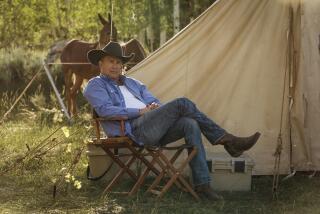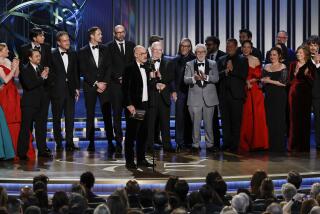Saying goodbye: “Downton Abbey’ was magic’
It all began with a gleam in Gareth Neame’s eye. “The English country house genre is a perennial favorite, but it hadn’t been done for a generation,” says the “Downton Abbey” executive producer. He wanted to return to that fertile British territory, telling the story in a contemporary manner this time. And his only choice to write it was Julian Fellowes.
Fellowes initially needed convincing. “It felt a bit greedy,” says the Oscar-winning screenwriter of “Gosford Park,” which was set in a similar milieu. “In my head, I could see the critics say, ‘Oh, this was so much better in the film.’ So I held back a bit.”
But not for long — about a month after they met, Fellowes sent Neame an email describing the main characters. The writer had adapted books for British television, but had never created his own series and was attracted by the idea of taking his characters, and their audience, on an original journey.
Finding the abbey a television home proved more difficult. Rebecca Eaton, executive producer of “Masterpiece” on PBS, famously passed on it. “Not because I didn’t like it, but it was the same season that we were doing the remake of ‘Upstairs Downstairs,’ and I thought they would be too similar,” she says. Fortunately, everyone else passed on it too. “I remember an American executive saying that nobody in the United States would ever be interested in this idea,” says Neame. By the time it made its way back to “Masterpiece,” Eaton had said yes.
The rest is global television history. “Downton Abbey” first became a hit in England, “then we sold it to every territory that you could sell TV content to,” says Neame. The highest-rated show in PBS history, “it was a shot in the arm for our brand,” Eaton says, lifting the ratings for every other series after it “like the proverbial rising tide.”
It accrued 59 Emmy nominations — the most of any foreign show — and 12 wins, mostly for makeup, music and Maggie Smith. The show also won the miniseries or movie category in its first outing, as did Fellowes. And its costumes have been nominated every time out. More than that, the show entered the cultural conversation, even becoming a popular target for satire, the ultimate imprimatur.
Beginning in 1912 and moving forward through the ’20s, the show commented on a wide swath of historical change through the small stories of its ensemble. Love, loss, family squabbles, job security, education, class, race and religion were all fodder. And, in this age of rampant vulgarity, it was all so very genteel. Even the Great War had the decency to take place mostly off-screen.
Any breaks in that gentility sent ripples through the c
ulture. When Matthew Crawley died, Fellowes recalls, “God, people were angry. ‘I will never watch anything with your name on it again!’ ” He saw the compliment behind the rage; they cared that much. “Sybil’s death elicited some of the most moving letters I’d ever received in my life, from people whose daughters or wives had died in childbirth. That was extraordinary.” He received similar responses after Anna’s rape. “I got a lot of letters from women who had felt at the time they were raped that in some way they were to blame, they were saying that the story helped them understand there hadn’t been any guilt,” he says.
The finale doled out happy endings to just about everyone upstairs and down, including, thank heavens, poor Edith, and reams were written about how the series transformed the TV landscape. But has it? Eaton doubts we shall see anything quite like it again.
“ ‘Downton Abbey’ was a beautifully written, beautifully produced anomaly,” she says. After all, “Masterpiece” has aired period dramas just about every Sunday for 45 years. “ ‘Downton Abbey’ was magic, and had all the right ingredients and all the right timing.”
Adds Fellowes, “The only thing I think we did do was, when we were starting out, there was a kind of general belief that the audience for period drama was dead, and I think we have shown that audiences are never dead. It’s like the audience for musicals. People are always saying that’s finished now, but nothing’s ever finished really.”
Not even “Downton.” The producers are now tossing around the possibility that the series may yet return as a feature film. Please do not toy with us, good sirs.
MORE:
In Memoriam: Remembering everyone who died on ‘Downton Abbey’
Critic’s Notebook ‘Downton Abbey’ did more to push TV into a new golden age than any other show
‘Downton Abbey’s’ Julian Fellowes balanced resolution and change in final season
More to Read
From the Oscars to the Emmys.
Get the Envelope newsletter for exclusive awards season coverage, behind-the-scenes stories from the Envelope podcast and columnist Glenn Whipp’s must-read analysis.
You may occasionally receive promotional content from the Los Angeles Times.






